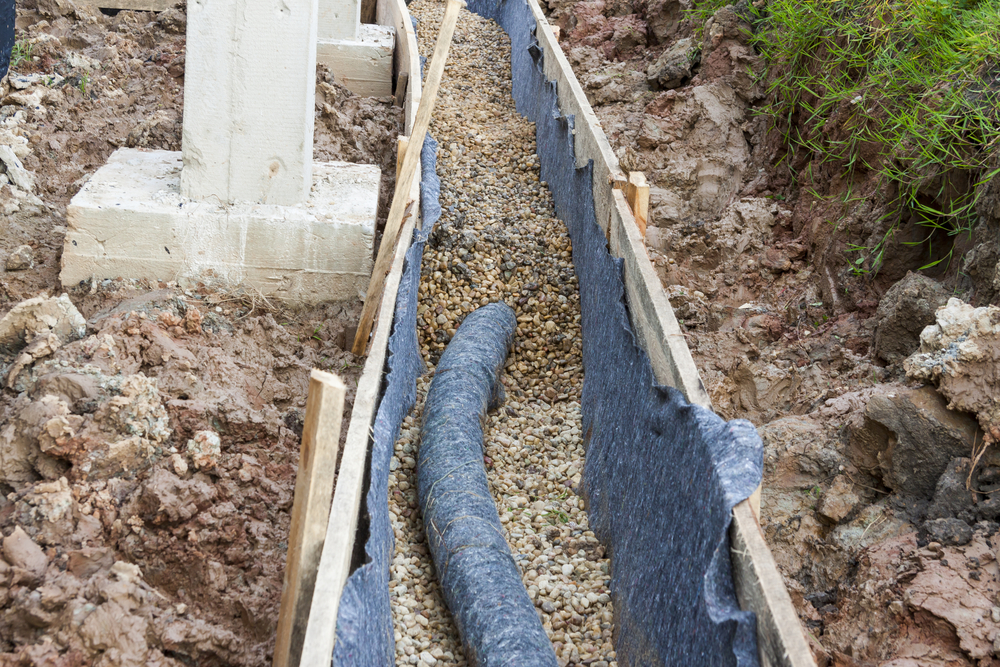
Excess water around your home can lead to serious issues—soggy lawns, basement leaks, foundation cracks, and even mold growth. If you're dealing with drainage problems, a French drain might be the right solution.
French drains are a time-tested way to redirect water away from your home, preventing damage and costly repairs. But how do you know if you need one? You can always ask a professional if a French drain will solve your water woes, but there are questions you can answer for yourself that will give you a good idea and you’ll be better informed if you decide to install one.
What Is a French Drain?
There are several types of French drains, but they all serve the same essential purpose: collecting excess water and directing it away from your home or yard to a safe drainage point, such as a dry well, drainage ditch, or the street.
How Does a French Drain Work?
French drains work by taking advantage of gravity—water naturally flows downhill, and French drain systems provide a controlled path for it to follow. By redirecting water, they help keep your basement or crawl space dry, protect your home’s foundation, and prevent pooling in your yard or driveway.
The system consists of a gently sloped trench (about one inch of slope per eight feet) filled with gravel and a perforated pipe. As water seeps into the trench, it filters through the gravel and enters the pipe, which then channels it away from your home, reducing the risk of flooding and water damage.
Signs You Need a French Drain Installation
If you’re dealing with any of the following problems, you could benefit from French drain installation for your Maryland or Delaware home.
1. Water in Your Crawl Space
Water in your crawl space is never a good thing. Aside from damaging your home and your belongings, water promotes mold growth, which can make your family sick. If there’s water in your crawl space, a French drain might be the best solution.
There are two ways to get rid of water in your crawl space with a French drain: an exterior French drain installed around your home’s foundation or an interior French drain inside the crawl space. In many cases, an interior drain is the more cost-effective and efficient solution. In both cases, you may also need to install a sump pump to help collect water and carry it away from your home.
2. A Soggy Yard or Washed-Out Driveway
Does the rain soak your lawn or wash out your driveway? These problems aren’t just annoying, they’re also a sign that you need better drainage to protect your home and foundation. A shallow French drain might be the perfect solution. Shallow French drain systems intercept and redirect water before it can pool in problem areas, so your yard and driveway stay dry.
3. Building a Retaining Wall
If you're building a retaining wall on a slope or hillside, installing a French drain behind the first row of blocks is essential. Without proper drainage, water can build up at the base, increasing pressure and potentially causing structural failure or directing runoff toward your home. A French drain helps manage water flow, keeping your retaining wall stable and effective.
Can You Install a French Drain Yourself?
While it’s possible to install a French drain yourself, it’s not as simple as just digging a trench and laying a pipe. Proper installation requires careful planning, the right slope for drainage, and knowledge of potential obstacles like underground utilities or local drainage regulations. A poorly installed drain can quickly become ineffective—or worse, cause new drainage issues. Hiring a professional ensures your system is designed correctly, preventing costly mistakes and saving you time and effort.
Find the Right Drainage System for Your Home
If you're dealing with persistent water problems and think you need a drainage system, Total Home Performance can help! We are a local, whole-home contractor that uses building science to diagnose and repair problems in Maryland and Delaware homes. With over 16 years of experience serving local homeowners, we know how to safeguard your home against moisture and the many problems it causes. Our experienced, certified professionals will inspect your home and recommend the most effective drainage solution.